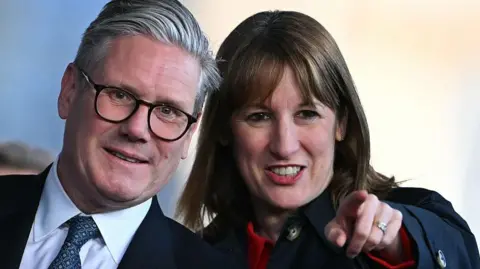Simon JackBusiness editor
 WPA Pool/Getty Images
WPA Pool/Getty ImagesOne of the key audiences that the prime minister and the chancellor will have to convince at this year’s Labour conference are the business leaders they targeted with a charm offensive before the election last July.
The party trumpeted itself as “the natural party of business” and Rachel Reeves told anyone and everyone that this would be “the most pro-business government this country has ever seen”.
Labour had some big business beasts backing them. Billionaire mobile phone tycoon John Caudwell – a long-time Conservative supporter – switched his backing to Labour.
Some 120 business leaders signed a letter which read: “We, as leaders and investors in British business, believe that it is time for a change. For too long now, our economy has been beset by instability, stagnation, and a lack of long-term focus.
“Labour has shown it has changed and wants to work with business to achieve the UK’s full economic potential.”
But post-election, the party sent a different message – warning of tough choices and hard times ahead, and delivered a Budget to prove it.
That Budget, says John Caudwell, with its £25bn rise in employers’ National Insurance, undid a lot of the goodwill the chancellor had garnered.
“I think there was a desperate loss of faith from the business community in general from the last Budget,” he says. “I think people were shocked at the level of negative components for businesses.”
On top of that NI rise, the National Living Wage was hiked by an inflation-busting 6.7%, with a rise of 16% for 18 to 20-year-olds.
Mr Caudwell says he understands that Labour needed to raise money to shore up the public finances but felt it hit some sectors unduly hard.
“Even if you say they needed to be done, certain aspects were very unfair. So if you look at the increase in employers’ NI, that really badly hit those businesses that employ tens of thousands of people on low wages, because they got hit by minimum wage and they got hit by the NI.”
 PA
PAOther small business owners have also told the BBC they have lost confidence.
Rachel Carrell is the boss of childcare firm Koru Kids and signed that letter in 2024. She says she hopes the government can restore business confidence over the rest of the parliament.
“I wouldn’t sign that letter today but they’ve got three or four years to turn this around. That’s a really long time.”
She believes there’s an opportunity to fix things in the upcoming Budget, but says “they need to move quickly”.
While anecdotal evidence of crumbling business confidence is not hard to find, official measures show a mixed picture.
The Institute of Directors’ confidence measure shows a steep fall after the last election, which compilers put down to immediate warnings issued by the government once in power that tough times and tough choices lay ahead.
That was duly delivered on by the Budget and has hovered near those lows ever since.
However, the government’s favourite index to quote is the Lloyds Bank confidence survey, which shows confidence on the future is much more robust.
Other measures, including the ICAEW and the S&P PMI measures, tend to support a more gloomy outlook.
That in turn is supported by the number of businesses looking to recruit.
Job vacancies have been on a downward trend since the Covid pandemic and there are 150,000 fewer staff on payrolls now than there were before the Budget bombshell, with a large part of those jobs going in hospitality.
However, there is widespread hope among smaller businesses that the long-promised overhaul of business rates will come soon and in their favour.
The government points understandably to the enormous amounts of money pledged recently when tech royalty from Apple, Nvidia, Microsoft and others met real royalty at US President Donald Trump’s recent state visit.
John Caudwell welcomed it too.
“I hear a lot of negativity about government – we hear about rich people leaving and they are useful to the UK economy, but they’re not as useful as the £150bn of inward investment that we’ve got coming into the country to create high-paid jobs in high-technological businesses. So we have to get a balanced view on that.”
Mark Hargreaves runs a trolley and tray manufacturing and export business in Peckham, south London. He is less impressed with the razzamatazz surrounding the tech billionaires and their largesse.
“I’m sure it’s very important to get these racy high-growth sectors to invest here. But what about the less exciting bits of the economy – the ones who are always here? We feel forgotten.
“I was hopeful that a new government would give us some help but all my costs have gone up – my business rates have doubled. I’m more cautious about investing in a new machine, a new product, hiring a new person.”
The new Employment Rights Bill, which confers greater rights and protections on employees from day one, is also adding to employers’ reluctance to take on new staff.

The government has made much of its plans to sweep away impediments to economic growth and has seen that acknowledged by some of the biggest investors in UK infrastructure.
Just months after Labour entered Downing Street, Scottish Power announced a £24bn UK investment.
Keith Anderson, chief executive of Scottish Power, says: “The government has taken on the planning bogeyman to unlock growth and get us building. That’s why the UK is now Iberdrola’s biggest investment destination globally.”
Rain Newton-Smith, director general of the employers group the CBI, also gives the government high marks on the international stage.
“I think this government have navigated really difficult geopolitics. We’ve got a better deal with the US than others, we’re forging a closer relationship with Europe and they got the deal with India.
“They’ve got a lot of work done internationally, and that does count. But they’ve really got to dial up delivery, and make sure that they they learn from the mistakes of last autumn.”
Business confidence is a vital but fragile thing. It’s a key ingredient for any government hoping that economic growth will pay for its other spending commitments – on heath, defence and welfare.
Labour has a job on its hands at conference, and at the Budget, to restore the animal spirits of UK business.





